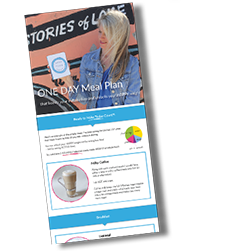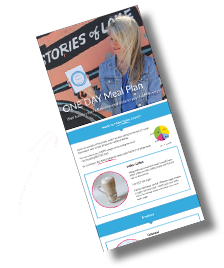
- Why do we think life will get better when you lose weight?
- What actually happens when you lose weight?
- Learn a solution to losing weight and reaching all your goals
This post debunks the 1st of 5 common weight-loss misconceptions:
Life will get better when you lose weight
All 5 misunderstandings were captured in a short diary entry written by a 13 year-old. Rebecca courageously shared her weight-loss struggle on the Grownups Read Things They Wrote as Kids Podcast. To get the most out of this post, read Common Weight-loss Misconceptions Intro to hear Rebecca’s diary entry.
Will your life get better when you lose weight?
 When I was trying to lose weight I felt badly about myself.
When I was trying to lose weight I felt badly about myself.
I wanted to write this post to let you know weight loss has nothing to do with strength of character. It’s just marketed that way. My hope is that you’ll learn from my experience and change how you approach losing weight. Then it will be easier to work smarter, not harder.
Common weight-loss misconception #1:
Life gets better when you lose weight
13 year-old Rebecca:
“Every time I look at myself in the mirror I am unhappy … I feel if I was thin it wouldn’t be as bad. I wouldn’t feel as bad about myself as I do.”
Problem:
We’re inundated by media telling us how we should look:
Beauty Pressure, A Dove Film
These narrow beauty expectations are taught to anyone who’s watching, reading or listening to media:
In a survey of adolescents in grades 7–12, 30% of girls and 25% of boys reported teasing by peers about their weight. Such teasing has been found to persist in the home as well – 29% of girls and 16% of boys reported having been teased by a family member about their weight.
—source
We begin valuing ourselves based on how we think others perceive us. So we buy into the weight-loss industry. We look to the same people who made us feel bad (via all the weight-loss adverts) to ask them to help us feel good.
But the weight-loss industry over-complicates reaching and maintaining a healthy weight.
We’re told we need to go to extremes, follow detailed meal plans and steer away from the foods our friends eat. Rather than transition our old habits to new healthy habits, diets shock our system with food choices we’re not used to eating. Then the weight-loss industry pins our success on “willpower” so they don’t have to take responsibility when we can’t navigate the real world and stick to their ridiculously rigid diet.
So you try a new diet. Then another new diet … But before starting each one, you break all the rules imposed upon you on your last weight-loss plan. You build all these bad habits between diets. You develop a complicated relationship with food and gain more weight.
Dieting for weight loss is often associated with weight gain, due to the increased incidence of binge-eating.
—source
 Without realizing how you’ve been manipulated, you feel ashamed when you can’t lose weight and keep it off. You start seeing yourself as weak. In your eyes, your extra weight is a character flaw.
Without realizing how you’ve been manipulated, you feel ashamed when you can’t lose weight and keep it off. You start seeing yourself as weak. In your eyes, your extra weight is a character flaw.
This conclusion makes you desperate to redeem yourself so you can stop feeling badly about who you think you’ve become.
You believe you’ll feel good again when you lose weight.
My experience thinking life will get better when you lose weight:
When my (self-defeating) approach to weight-loss led me to gain weight, I became frustrated. Hard work always helped me reach goals. The only conclusion I could come to was that I needed to work harder. Being overweight made me feel like I lacked discipline. In reality, I had all the wrong weight-loss information and was running with it.
As time passed without success, I stopped being proud of my accomplishments at school and sports and anything social took a back seat. Instead I became hell-bent on losing weight.
Why couldn’t I reach this goal?!?!
Dropping out of everything I was interested in allowed me to put more energy (behind the wrong information!) into trying to lose weight. I wanted to walk through each day without feeling self-conscious in my body. I wanted to know I was trying my best. And I used my weight to measure my efforts. I wanted to feel good again.
In hindsight, the more I focused on weight loss, the more difficult it was to lose weight.
The positive side of things getting so bad was that it forced me to ask for help. Then I could get to the bottom of how to lose weight. In my first year of university I went down to the student health services and started seeing a psychiatrist. Our weekly conversations were basically spent dismantling the false weight-loss information I’d collected over high school. Like I learned you can and should eat fat. My doctor also explained how the body works. Then he taught me that reaching and maintaining a healthy weight was all about going back to the basics; eating 3 balanced meals each day made of whole foods and exercising moderately.
Be kind to yourself! When you’re good to your body and respect it’s needs, your body is good to you.
 When I finally had the courage to try the new things I learned (all the information I write about in this blog) I reached a healthy weight naturally. But after the initial excitement faded, I had a new problem.
When I finally had the courage to try the new things I learned (all the information I write about in this blog) I reached a healthy weight naturally. But after the initial excitement faded, I had a new problem.
I’d been so caught up in dieting (taken to extremes by my underlying issue: OCD) that I’d neglected other areas of my life. It had been 10 years since I’d invested myself in activities and people I cared about—all the things that connected me to the world in important ways.
That’s when I learned life does not get better when you lose weight.
Solution: Understand life doesn’t get better when you lose weight
I am not a doctor, but I lived with an eating disorder for 10 years. Now, with 18 years of healthy living behind me, I want to share the information that would have helped me when I believed: life will get better when you lose weight.
1. Understand weight loss isn’t about determination
Weight loss is about educating yourself. You need to learn what healthy eating and exercise habits look like. And practice a healthy strategy to reach those goals. Steer clear of weight-loss advice that focuses on willpower! Self esteem shouldn’t be tied to your weight.
You’re not an undisciplined person if you’ve struggled with your weight. You’ve just been flooded with misinformation that makes it difficult to make healthy choices. In fact, when you try so hard to lose weight with the wrong information, you can find yourself way off track (like I did). This result actually highlights how committed you are to reach goals and it’s nothing to be ashamed of. But now is the time to get healthy! You simply need to put a little bit of your amazing energy behind good information. Small changes make a big difference.
2. Ignore the pressure to invest in superficial things
Remember billboards, commercials, advertisements and all the product placement in movies and even books (think Fifty Shade of Grey!) are all about trying to get you to buy something—including weight-loss plans and low-fat processed foods. Retail therapy is a bottomless pit.
 3. Think about what makes you truly happy
3. Think about what makes you truly happy
Happiness is all about people in your life who genuinely care about you and pursuing your interests. Make people and your passions a priority! Build your self worth around your actions. Your character is based on your interests and how you use them. The people who come into your life because of what you do (rather than how you look) are the ones you’ll want to get close to. Invest in things that get better with time and effort. Then you’ll create a meaningful life full of lasting happiness.
Guess what?! You’ll also find weight-loss is easier when you’re not putting every choice you make under a microscope. When you stop jerking your body around with diets and instead, go back to the basics with eating and exercise while focusing on your interests, you’ll find you naturally reach a healthy weight.
Ask yourself: Are you investing in other ares of your life while building healthy eating and exercise habits? Don’t worry if you haven’t been for a while.
There is a crack in everything, that’s how the light gets through.
-Leonard Cohen, musician
There’s many important things in life you learn through difficult experiences. Don’t regret what you’ve been through. Just keep moving forward and focus on a solution.
 Ever hear the expression “Don’t put all your eggs in one basket?” Regardless of what goal you’re after, divide up your energy. Working toward a few things that matter to you (especially the kind actions you can do for others) gives you solid reasons to feel good about yourself—instead of feeling good because you look good.
Ever hear the expression “Don’t put all your eggs in one basket?” Regardless of what goal you’re after, divide up your energy. Working toward a few things that matter to you (especially the kind actions you can do for others) gives you solid reasons to feel good about yourself—instead of feeling good because you look good.
Take a piece of paper and fold it into 4 squares. Give each quadrant one of the headings that follows and write down a few things in each box that matter to you.
Career Goals:
What role do you want to play in the world? What’s unfair in your community or beyond that makes you feel frustrated? How can you fix it?
Hobbies:
What makes you feel free? Do you love painting, spending time outdoors or being part of a team?

Rocky is a palliative care foster dog from the Humane Society. He’s done more for us than we could ever do for him.
Living Things:
Who do you care about? List the people, animal & environmental causes that matter to you.
Health:
What healthy eating, exercise, sleeping etc. habits are you working toward? What is one small change you can make? For example, you could add a piece of fruit to your breakfast to make it more balanced. Ironically, I lost weight when I started focusing being healthy instead of trying to be thin.
Once you’ve added a few ideas, consider this piece of paper to be a gratitude list. These are people and plans you’re lucky to have.

Next, make an effort to invest your time in these four areas of your life. Just take small steps each week toward each of your 4 goals. Soon your efforts will add up and you’ll experience how rewarding it is to make your interests a priority.
Focusing on a few goals at once will also give you balance. You’ll be surprised how each of your interests compliments the others. For instance, when you’re busy writing for the school paper or completing an important presentation for work, eating and exercise choices become more natural because there’s no time to get lost in the details.
Keep this piece of paper in your wallet, backpack or somewhere handy.
Life doesn’t get better when you lose weight. Life gets better when you focus on things you care about that lie beyond yourself—while you build healthy habits. A healthy weight will follow.

Summary of why life doesn’t get better when you lose weight:
It’s important to make losing weight a health goal you work toward rather than where you base your self worth. Focus on real beauty: your interests and how you use them.
*Remember, weight loss is not about determination. Weight loss is about educating yourself. It’s important to understand what healthy habits look like and have a healthy strategy to reach those goals.
Build healthy eating and exercise habits. A healthy weight will follow.
You’ve got a list of goals in four areas of your life. Now it’s time to work toward them! If you’re not sure how to begin, sign up for my weekly blog post (below) and you’ll receive one of the best strategies I learned. It will help you build healthy eating, exercise and life habits—or reach any goal.

 These kinds of meals and snacks unlocked my HAPPY weight 21+ years ago (I lost 30 pounds without dieting!)
These kinds of meals and snacks unlocked my HAPPY weight 21+ years ago (I lost 30 pounds without dieting!)
You'll also be subscribed to my newsletter. Don’t like it? Unsubscribe in one click

 These kinds of meals and snacks unlocked my HAPPY weight 21+ years ago (I lost 30 pounds without dieting!)
These kinds of meals and snacks unlocked my HAPPY weight 21+ years ago (I lost 30 pounds without dieting!)
You'll also be subscribed to my newsletter. Don’t like it? Unsubscribe in one click




Sharing what I learned makes the 10 years I STRUGGLED worth it
When do you first remember thinking life will get better when you lose weight? Was it when something happened to you and you thought it would have worked out differently if you were thin? If that’s the case, was that person or goal really worth it if weight would make all the difference?






Thank you Kelly. This is too well said and important not to share. It rings true. Your personal experience and knowledge are invaluable. There are kids in our extended family coming of age soon where this message will have great preventive potential. I’m forwarding it to their families.
Thanks for sharing the post Doug!
It’s crazy how many times a day we’re faced with advertisements suggesting we change something superficial about ourselves.
This is a great post. Self worth and inner change (and love), should always be the starting point.
This is a great message.
Thanks Kevin! Trying to follow diet rules, tips and tricks (vs. going back to the basics with healthy eating) made it easy to get preoccupied and lose sight of what’s real and important.